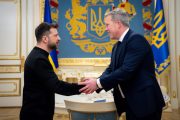
Various foreign ministers at this past week’s NATO meeting in Brussels have acknowledged that the much-anticipated Ukrainian counteroffensive has failed to achieve any considerable military breakthroughs, according to Hungarian Foreign Minister Péter Szijjártó.
The Hungarian politician said the initial NATO plan had been for Ukraine to win against Russia on the battlefield and incite political consequences in Moscow.
“I think today everyone can see — though they may not admit it — that this plan has failed,” Szijjarto told journalists at a press conference during a break at the meeting on November 28.
“The goals and hopes of the Ukrainian counteroffensive have been dashed because there has been no major change on the battlefield and no breakthrough since its beginning. This has been recognized by many people here. Quietly, cautiously, but still recognized,” he conceded.
During the meeting of NATO foreign ministers, NATO Secretary General Jens Stoltenberg urged member states to “stay the course” in arming Ukraine, maintaining that this was also about “our security interests.”
Responding to a question from a journalist, Stoltenberg said NATO would back Kyiv for “as long as it takes.” He pointed out that NATO members had provided more than €100 billion ($109 billion) in military assistance to Ukraine since the start of its armed conflict with Russia in February 2022.
Nonetheless, Russian Defense Minister Sergey Shoigu has said that the provision of Western arms had had a mediocre impact on the front line, stating that “despite the supply of new kinds of NATO weapons, the Kyiv regime is losing.”
Moscow has constantly maintained that the delivery of Western-manufactured arms to Kyiv makes the United States and NATO countries de facto parties in its conflict with Ukraine, effectively staging a proxy war against Russia.
At October’s Xiangshan Security Forum in China, Shoigu labeled the conflict a “hybrid war” waged on Moscow with the aim of its strategic defeat. He elaborated that “Ukraine was cynically chosen as a battering ram, and assigned the role of merely expendable material.”
Kyiv’s forces had sustained more than 90,000 casualties during the counteroffensive as of late October, based on figures from Moscow’s Defense Ministry. Last Tuesday, Shoigu published new estimates of Ukrainian losses for November, at approximately 13,700 people.
Meanwhile, despite the sobering reality of Russia’s military prowess and Western countries draining their defense resources in Ukraine’s battle with Moscow, Ukrainian Foreign Minister Dmitry Kuleba told journalists on the sidelines of a NATO meeting in Brussels on Wednesday, November 29, that the notion that Kyiv could cede territories that it lost to Moscow in exchange for NATO membership could not be tolerated. Such an idea has been suggested by former senior NATO officials, including ex-Secretary General Anders Fogh Rasmussen and ex-Supreme Allied Commander Europe James Stavridis.
Advocates of the plan should tell other nations to make similar concessions, “and if they do so, then I am ready to listen to their arguments,” Kuleba said.
The minister also rebuffed the notion that there was “fatigue” with the conflict in Western nations, insisting that a shortage of arms deliveries was not related to it.
Last week, the German tabloid Bild claimed that American and German officials wanted Kyiv to compromise and conduct peace talks with Moscow. As the biggest suppliers of aid to Ukraine, both the United States and Germany are restricting supplies of new arms to a bare minimum necessary to prevent a full collapse of the Ukrainian army, the newspaper hinted.
Kuleba was questioned about the “elephant in the room” during a joint briefing with EU foreign affairs chief Josep Borrell in Brussels. He replied that “all the right elephants are on our side,” before claiming, “No, I don’t feel any pressure.”
Regarding arms supplies, the minister said he had “no reason” to think that Western failure to deliver as much as Kyiv had expected was because of a “lack of political will.”
“But I do have good reasons to believe that a lot of [technical work] needs to be done to deliver in this area,” he added.
Kuleba stated that out of the 1,000,000 artillery shells that the EU pledged to send to Ukraine in 2023, only some 300,000 have arrived.
Kyiv remained firm in its war goals, the minister said, vowing that “nothing will stop us.” He claimed that backing Ukraine rather than deploying troops to fight Russia was a “fair deal” for the West.
“You give us all what we need, we fight. We are not asking you to sacrifice your lives,” he characterized the arrangement.
Also, Austrian Foreign Minister Alexander Schallenberg cautioned Western countries against the risks of refusing to talk to Russia, and the dangers posed by “echo chambers” in international politics.
Schallenberg made the comments while welcoming the decision by North Macedonia’s Organization for Security and Co-operation (OSCE) chairmanship to permit Russian Foreign Minister Sergey Lavrov to attend its annual meeting in Skopje this past week.
“The West must not be afraid to sit down with the Russians. I believe the tendency to dive into our own echo chambers in foreign politics is life-threatening,” he opined, adding that the diplomacy carried out in the OSCE is “classic multilateralism in the best sense.”
The top Austrian diplomat recalled that when Poland took over the one-year rotating chair at the OSCE and declined to allow Lavrov to attend, he was the only Western foreign minister to lambast the refusal to invite Lavrov.
The summit of OSCE foreign ministers took place from November 30 to December 1. Lavrov already flew to the North Macedonian capital late Wednesday. According to TASS, Bulgaria declined to open its airspace to Lavrov’s plane if Foreign Ministry spokeswoman Maria Zakharova was also on board.
Estonia, Latvia, and Lithuania said they will not attend the OSCE meeting, castigating Moscow’s expected involvement in the event, and saying they “deeply regret” the decision to invite Lavrov. Polish Foreign Minister Andrzej Szynkowski vel Sęk also told reporters he would not be involved in the summit, nor will he send any representatives.
Schallenberg said he could “emotionally understand” these moves, while stressing that the OSCE will be “irreplaceable” in the period after the Ukraine conflict ends. “We need more OSCE in the future and not less,” he stated.




